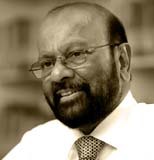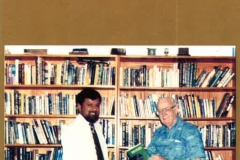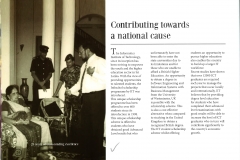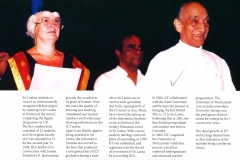Dr. Gamini Wickramasinghe, a pioneer in the software industry and private education in Sri Lanka, is the Founder and Chairman of the Informatics Group.
His University education was in England and Belgium. He returned to Sri Lanka in 1983 and established Informatics as a computer company. Informatics was a total turnkey solution company, which offered hardware, software, training and maintenance – i.e. the full range of requirements were offered.
With the realization that there was then a dearth of IT conversant human resources in Sri Lanka because the Universities were not producing a sufficient number of IT graduates to meet Sri Lanka’s demand, Informatics, in 1990, tied up with Manchester Metropolitan University to offer degrees in IT, Information Systems and Computer Science. Informatics was the first institute offering British degrees in Sri Lanka. Thus, Dr. Gamini Wickramasinghe pioneered the concept of offering British tertiary education in Sri Lanka.
Dr. Wickramasinghe states that IIT alumni are encouraged to start entrepreneurial businesses and to set up their own operations. He says that tertiary education institutions should develop individuals in areas for which they are most suited and where there are opportunities available internationally. Sri Lanka could then benefit enormously by producing human resources as “international products”, through foreign exchange earnings and other economic benefits. Dr. Wickramasinghe is of the view that it would be expedient for Sri Lanka to cultivate specific niche areas.
Dr. Gamini Wickramasinghe was acknowledged as a pioneer in the ICT industry and was awarded a token of appreciation at INFOTEL 2014, from FITIS (Federation of Information Technology Industry of Sri Lanka) for the service he has rendered over the years to the ICT industry in Sri Lanka.
Video in Brief
Full Video
Dr. Gamini Wickramasinghe, a pioneer in the software industry and private education in Sri Lanka, is the Founder and Chairman of the Informatics Group. Dr. Gamini Wickramasinghe’s University education was in England and Belgium. He studied computing and systems analysis.
Dr. Wickramasinghe returned to Sri Lanka in 1983 and established Informatics as a computer company. Informatics was a total turnkey solution company, which offered hardware, software, training and maintenance – i.e. the full range of requirements were offered. Dr. Wickramasinghe recollects that most of the larger companies such as IBM, ICL and Burroughs were represented in Sri Lanka in 1983.
When Dr. Wickramasinghe returned to Sri Lanka in 1983 he found out that in Sri Lanka at that time, a hardware vendor sold only hardware, others sold software, but when customers required assistance, they did not know from whom to seek assistance.
Therefore, he put into action his new concept of having just one phone number for obtaining assistance with regard to hardware, software, maintenance and for training requirements, so that customers did not have to go from one to another for their different computing requirements. The target was to eventually have happy customers who received everything for which they had paid. Informatics offered a product called Nixdorf which included both hardware and software. It was a total turnkey solution.
Thereafter, Informatics commenced customized software development and then encountered an impediment; there was a dearth of IT conversant human resources in Sri Lanka because all the national Universities were not producing a sufficient number of IT graduates to meet Sri Lanka’s demand. The only institution, Dr. Wickramasinghe states, that they could rely on was NIBM (National Institute of Business Management) of which Dr. NWN Jayasiri was the Director MIS. NIBM produced Diploma holders with six months training in computing, whom Informatics recruited and trained further. This issue gave Dr. Wickramasinghe the idea of educating and producing computer graduates in Sri Lanka in partnership with a British University.
Therefore, in 1990, Informatics tied up with Manchester Metropolitan University to offer degrees in IT, Information Systems and Computer Science. Informatics was the first institute offering British degrees in Sri Lanka. Thus, Dr. Gamini Wickramasinghe pioneered the concept of offering British tertiary education in Sri Lanka. Impediments encountered during this early phase included the fact that it was difficult to find the necessary staff for training the undergraduates and also the fact that people had no confidence in a new company providing undergraduate education. Therefore, it was necessary to inculcate confidence in potential students and their parents. The company Dr. Wickramasinghe set up was the Informatics Institute of Computer Studies (IICS) which is now known as the Informatics Institute of Technology (IIT). Dr. Wickramasinghe recollects that Mr. Lalith Athulathmudali, who was then the Minister of Education had been highly supportive, had given guidelines, informed him of the boundaries and kept him on the right track. The main advantage had been that Informatics offered a British degree in Sri Lanka which cost less than going to the UK for the same degree. This was an internal degree. Degree courses of the Manchester Metropolitan University were delivered in Sri Lanka – it was the same degree that was awarded by the British University in the UK. Graduates had their names listed in the respective British Universities as alumni. IIT undergraduates had to undergo an “Industrial year” which they had to spend in the Industry. This had been implemented from the inception and Dr. Wickramasinghe states that National Universities have also adopted this idea. He says the objective is to build a competent, confident professional. Dr. Wickramasinghe is pleased with the outcome of what he started. At the previous years’ Microsoft Imagine Cup competition, all the National Universities and private Universities had competed and Informatics had won 6 out of 9 medals. The alumni of IIT are now in significant positions in key organizations, and there are those who work in the export sector in Sri Lanka. Therefore, Mr. Wickramasinghe states these IIT alumni have earned foreign exchange for Sri Lanka. Dr. Wickramasinghe stated that IIT had recently completed 25 years of offering British degrees, of which they were the pioneers.
He states that they had also trained people to meet the requirements of the projects which they implemented for the Government of Sri Lanka and for the private sector. Turnover of staff is a problem which Dr. Wickramasinghe states is difficult to prevent. He states that at present, most companies have employed graduates from IIT and have also employed former employees of Informatics. IIT alumni are encouraged to start entrepreneurial businesses and to set up their own operations. He states that even at present there is a big gap between the supply of IT graduates and the demand. He says that tertiary education institutions and National Universities should develop individuals in areas for which they are most suited and where there are opportunities available internationally. Sri Lanka could then benefit enormously by producing human resources as “international products”, through foreign exchange earnings and other economic benefits.
Dr. Wickramasinghe is of the view that it would be expedient for Sri Lanka to cultivate specific niche areas. He says that then it would not be necessary to “compete with crowds”.
On education, there are plans to expand and to set up a campus for creating employable graduates of good quality and also offer postgraduate education. Education is offered from the foundation level to doctorates. Academic partnerships have also been forged with the University of Westminster, London; Robert Gordon University, Scotland and with Canterbury Christchurch University in England.
Dr. Wickramasinghe further explains that IIT is not be limited only to computing but offers computing degrees associated with business. They would enter areas, he says, which are being emphasized by the Sri Lankan economy. These areas include ICT, agriculture and education.
In conclusion, Dr. Wickramasinghe states that within the next 5 years, Informatics would commence large scale software development. Informatics, he explains, has already developed software for Sri Lanka’s immigration system and then implemented it in other countries such as Fiji and Mauritius. He further states that there are insurance products, too. What Informatics does, Dr. Wickramasinghe explains, is to internationalize the products and take these to other countries. He further emphasizes that theirs is a niche market. He states that companies such as IIT, which provide tertiary education and companies which develop software contribute towards the country’s economy and will also help to meet the objective of SLASSCOM (Sri Lanka Association of Software and Service Companies) of achieving exports worth USD 5 billion in 5 years. IIT, he says has contributed in its own way towards meeting these objectives.
Dr. Gamini Wickramasinghe acknowledged as a pioneer in the ICT industry and was awarded a token of appreciation at INFOTEL 2014, from FITIS (Federation of Information Technology Industry of Sri Lanka) for the service he has rendered over the years to the ICT industry in Sri Lanka.






